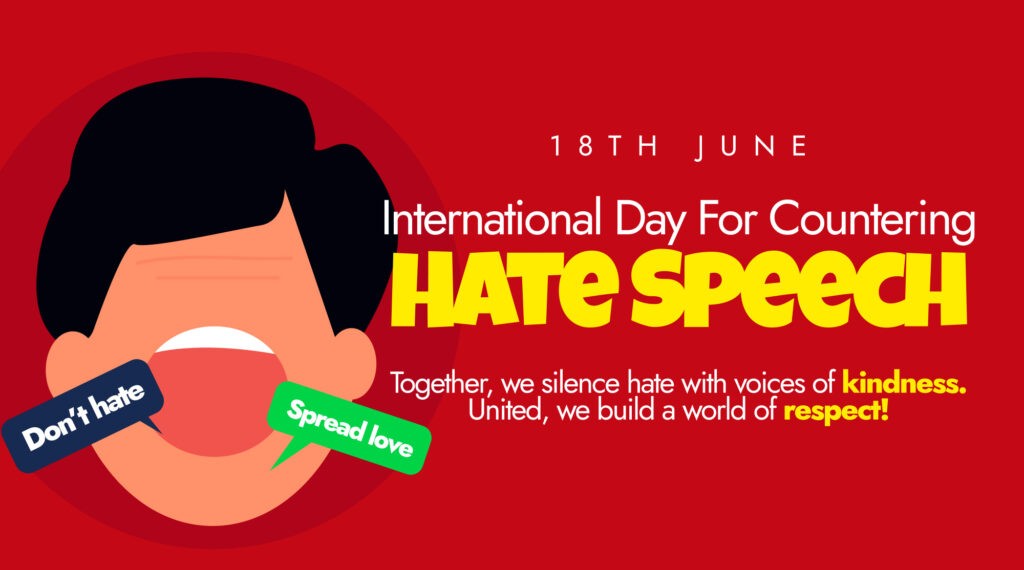I.M.A.M. UN Representative Attends UNESCO Global Hate Speech Day Event at United Nations Headquarters

On June 18, 2024, I.M.A.M. UN representative participated in a meeting organized by UNESCO at the United Nations headquarters in New York to commemorate the Global Day of Combating Hate Speech. This event brought together representatives from UN member states and NGOs with consultative status with ECOSOC. The I.M.A.M. representative underscored several critical points during discussions with other attendees:
The I.M.A.M. representative at the UN emphasized the Quran’s prohibition of cursing as it constitutes a form of hate speech: “Do not curse those who call on other than Allah, so they curse Allah without knowledge…” (Surah Al-An’am, 6:108). He also discussed the prohibition of cursing in the Ahl al-Bayt (pbut) School, citing an example where Imam Ali (p), the first Shia Imam, hears some of his companions cursing the people of Sham during the Battle of Siffin: “I do not like you to be abusive” (Nahj al-Balaghah, Sermon 206).
Additionally, he referred to Quranic guidance on unity, mentioning the Quranic verse (Surah Al-Hujurat, 49:13) to underline the idea that differences among people, including race and language, are meant for mutual understanding, not for justifying discriminatory behaviors and hate speech. The verse says: “O’ People, We have created you all male and female and have made you nations and tribes so that you would recognize each other. The most honorable among you in the sight of God is the most pious of you. God is All-knowing and All-aware.”
The I.M.A.M. representative at the UN also made the following points:
- Combating Hate Speech Against Vulnerable Groups: Emphasized the need to address hate speech targeting marginalized communities, including indigenous peoples, children, women, minorities (religious, linguistic, racial), individuals with disabilities, and refugees.
- Role of Victims in Combating Hate Speech: Highlighted the importance of educating the public on the potential for victims of hate speech to also become perpetrators, stressing the need for awareness and preventive measures.
- Criminalization and Education: Advocated for the criminalization of hate speech while also emphasizing the necessity of educational and awareness-raising efforts to prevent its occurrence.
- Rise of Online Hate Speech: Noted the increase in online hate speech, particularly in the aftermath of COVID-19, due to the extensive shift to internet-based activities.
- Gender-Based Hate Speech: Stressed the urgent need to prevent and combat hate speech based on gender, both online and offline.
- Respecting Diversity and Inclusion: Highlighted the importance of fostering respect for diversity and inclusion to prevent the divisive “us versus them” mentality, which can lead to various forms of violence, including hate speech.
- Normalization of Hate Speech: Stressed that despite its prevalence, hate speech should not be normalized.
- Hate Speech in Sports: Addressed the necessity of preventing hate speech in sports environments.
- Cultural Understanding: Emphasized learning about different cultures, beliefs, and lifestyles to prevent violence and hate speech.
- Preventing Radicalization and Extremism: Highlighted the role of combating hate speech in preventing radicalization and extremism.
- School and University Violence: Stressed the need to address violence and bullying in educational institutions as part of the broader fight against hate speech.
- Ecocide and Environmental Destruction: Discussed the link between hate speech and environmental destruction, noting how hate speech against an ethnic group can lead to violence and the destruction of their habitats.
- Peace through Empathy: Stressed that wars often start with hate speech, whereas peace begins with empathetic listening and non-violent communication.
- Avoiding Overgeneralization: Warned against overgeneralizing the actions of a few individuals to an entire group, which can spread hate speech and discriminatory behaviors.
- Responsible Freedom of Speech: Called for interpreting freedom of speech and the press in ways that prevent these rights from being misused to spread hate speech.
These points emphasized the comprehensive approach needed to effectively combat hate speech, encompassing legal, educational, and cultural strategies to promote understanding, respect, and peace.

Leave a Comment:
You must be logged in to post a comment.